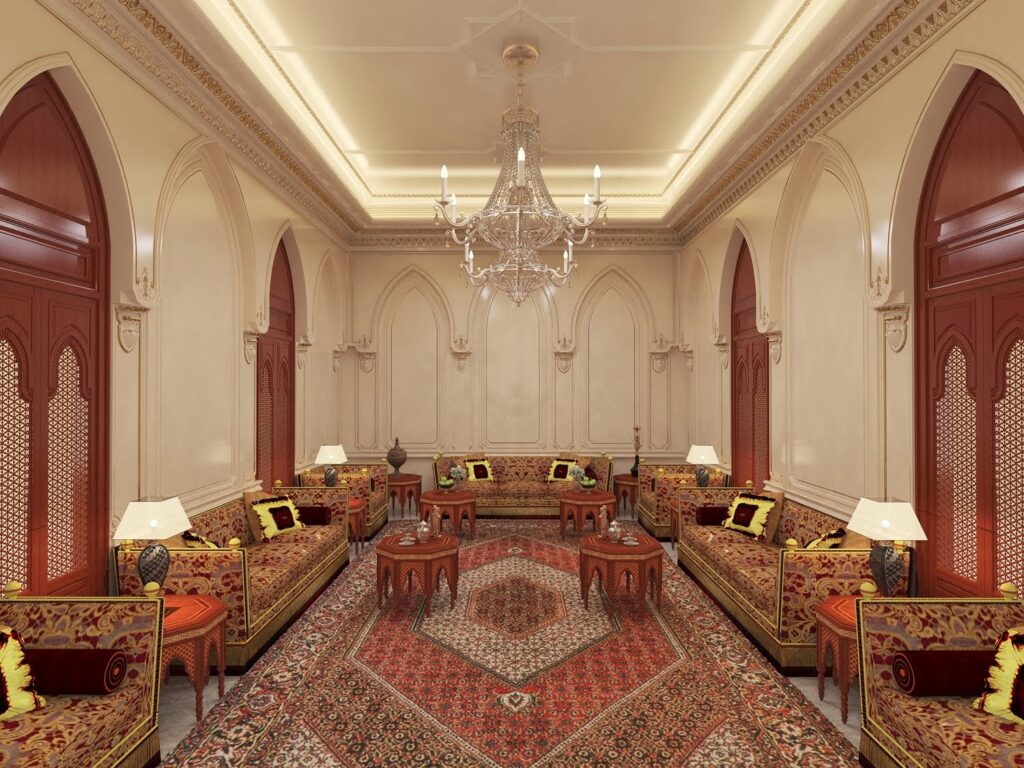The Essence of Arabic Majlis: Unveiling Middle Eastern Culture
The Arabic Majlis is an essential aspect of Middle Eastern culture that plays a vital role in promoting social cohesion and cultural identity. People gather in the Majlis, which is a traditional gathering place, to discuss a range of topics, such as politics, culture, and societal issues.
Since it is accessible to all societal members, this area is not restricted to any particular party or class. In this blog, we will explore the history, essential elements, and importance of the Arabic Majlis in Middle Eastern culture. We will also look at the Majlis’s significance in the modern world and how it can foster intercultural communication.
Historical Background Of The Arabic Majlis
Arab Bedouin tribes founded the Arabic Majlis. The Bedouins used to meet in a central tent called a “Majlis” to discuss important issues and make decisions that affected the tribe’s welfare. The Majlis became a formal gathering place where important guests and community members were welcomed and offered traditional hospitality. Bedouin culture included poetry, music, and storytelling in these gatherings.
This way, the Majlis, where influential people discussed politics, business, and social issues, became an essential part of Middle Eastern city life. The Majlis is still a vital gathering space in Middle Eastern homes, mosques, and public buildings. People exchange ideas and make decisions through consensus-building and consultation.
Elements Of The Arabic Majlis
The Arabic Majlis is a unique gathering space with several distinct elements that contribute to its cultural significance. Ahead are some of the key elements that you can expect to encounter:
Physical Setup
The Majlis is typically a large room or hall with traditional seating arrangements, such as low couches or floor cushions, arranged in a circular or rectangular formation. Decorative rugs, elaborate mats, and other classic Middle Eastern furnishings are frequently used to adorn the space.
Traditional Hospitality Practices
If you attend an Arabic Majlis, you can expect to be offered traditional hospitality, such as dates and Arabic coffee upon arrival. In some cases, guests may also be served a meal or refreshments during the gathering.
Food And Drink
The Majlis frequently includes food and drink in addition to the customary welcome. Visitors may be served traditional Middle Eastern fare like hummus, falafel, and shawarma in addition to non-alcoholic beverages like tea and fruit juice.
Cultural Activities
Poetry recitals, musical performances, and storytelling are all traditional cultural activities that may take place in an Arabic Majlis. These activities are often designed to promote cultural identity and foster a sense of community among attendees.
Overall, the Arabic Majlis is a very unique gathering space that offers a window into Middle Eastern culture and hospitality. If you’re interested in experiencing the Majlis for yourself, search for an Arabic Majlis Near Me to find local gatherings in your area.
Importance of the Arabic Majlis in Middle Eastern Culture
The Arabic Majlis is an essential aspect of Middle Eastern culture and plays a vital role in promoting social cohesion and cultural identity. The Majlis is significant in Middle Eastern society in the following ways:
Contribution to Fostering Societal Cohesion
People from all cultures can join together at the Majlis to socialize and share views. It creates social solidarity and encourages a feeling of community, both of which are crucial in an area that has seen recent political and social unrest.
Relevance in Reaching Decisions and Resolving Disputes
The Majlis is also an important space for decision-making and conflict resolution. By bringing together diverse perspectives and opinions, the Majlis can facilitate consensus-building and help resolve conflicts in a peaceful and respectful manner.
Preservation of Cultural Traditions
The Majlis is a space where traditional cultural practices such as poetry recitals, storytelling, and music can be celebrated and passed down to future generations. It plays a vital role in preserving cultural traditions and promoting cultural identity.
Equalizing Space
The Majlis is an equalizing space that is open to all members of society, regardless of social class or status. This promotes a sense of inclusivity and helps break down social barriers.
The Arabic Majlis promotes Middle Eastern social cohesion, cultural identity, and inclusivity. It facilitates decision-making, conflict resolution, and cultural preservation.

The Contemporary Relevance of the Arabic Majlis
The Arabic Majlis continues to be relevant in contemporary Middle Eastern society, and its importance has only increased in the modern age. The Majlis is still relevant today in the following areas:
- In a globalized world, the Majlis promotes cross-cultural dialogue and understanding. It allows people from different cultures to share ideas and promotes respect and understanding.
- The Majlis continues to foster community and social cohesion in modern Middle Eastern society. It fosters community by allowing people to discuss important issues.
- Many Middle Eastern countries use the Majlis for decision-making and governance. The Majlis serves as a governing entity in some nations while serving as a consultative organization in others.
- Video conferencing and social media are now common in Majlis gatherings.
Contemporary Middle Eastern society uses the Arabic Majlis for cross-cultural dialogue, community building, and decision-making. Technology and other innovations have helped the Majlis modernize while preserving its traditions.
Conclusion
In conclusion, the Arabic Majlis is a unique and important part of Middle Eastern culture that remains relevant today. It remains a place for decision-making, cultural preservation, and social cohesion. The Majlis is a popular method of decision-making, community building, and intercultural communication in many Middle Eastern nations. The Majlis has modernized by incorporating technology and other innovations. It is essential to contemporary Middle Eastern society and will continue to be for a long time.